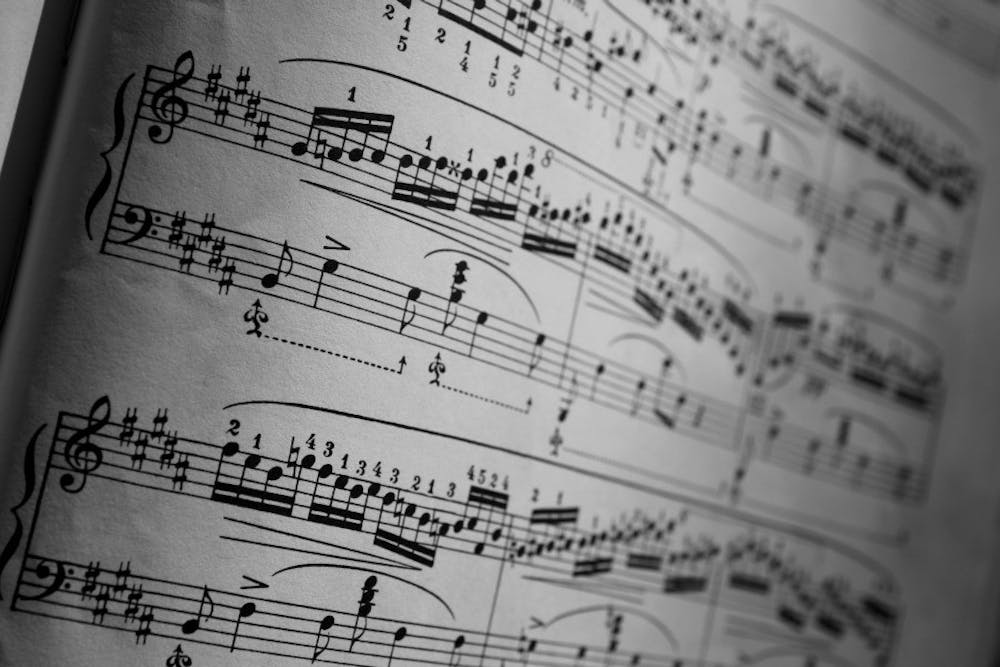By Ellen Stenstrom, For The Miami Student
Last Friday, the Miami University Choraliers and Chamber Singers performed their first concert of the year at Hall Auditorium. Dozens of concerts and performances happen at Miami every year, and truthfully, I doubt that this concert was significantly different from any other. But, as a first-year student and new member of the Choraliers, this performance was significant to me. It reminded me of why music is so special and influential, and why it so desperately needs to be kept alive.
In recent years, as school funding and finances are in limbo and many districts struggle to make ends meet, music and art programs are among the first to go. Countless articles have been written to rally support for the fine arts, providing generalizations and abstract statistics about its benefits, but this is not one of those articles.
I could talk about the 2007 study by Christopher Johnson from the University of Kansas, which found that schools with superior music education programs scored 22 percent higher in English and 20 percent higher in math on standardized tests than schools with low quality or nonexistent music programs, regardless of socioeconomic standing. I could go on about the College Board's study of the 2012 SAT, which showed that students who participated in music scored an average of 31 points higher in English and Writing sections and 23 points higher on the Math section than the average score. But I won't. I don't think music's importance can be quantified in statistics alone.
I participated in several choral ensembles growing up, and although I knew I wouldn't be majoring in music, I also knew that I needed to keep music in my life. That's one of the coolest things about the ensembles at Miami: the majority of students in Choraliers are not music majors, yet we all come together from our diverse areas of study and work together to create something beautiful.
Choir has taught me about delayed gratification - that you have to work hard now to feel even greater satisfaction from the end result. It taught me about living in the moment, being completely present in what I'm doing and appreciating the beauty created in a final performance - done once and then it's over. Choir has made me realize that we live in a society of consumers. It has allowed me to stop consuming and, instead, create something, to give something back to the world in the form of art.
There are many paradoxes in music. My high school choir director would always say, "I don't care if it's successful, I just want it to be significant." I think he meant that it doesn't matter if we sing every note perfectly and execute every dynamic marking, but what matters is if we can portray the message to the audience, to make them feel something, even in a small way. But I also believe he meant that it doesn't always matter what the audience thinks, because sometimes the impact is even greater for us, the performers.
I am blessed to attend a university that values the arts. Many music ensembles here are open to all majors, encouraging students to stay involved with the arts. And, I do think that the Miami Plan's fine art requirement is a valuable asset to students by pushing us to get a taste of the arts, which sometimes sparks an interest in further study.
However, the U.S. government, employers and schools are pushing the importance of STEM (science, technology, engineering, math) as early as the elementary level. In the technology age, people look to STEM careers as the future. This has caused schools everywhere to push for more advanced classes in STEM subjects. While these subjects are no doubt important, this push will come at great consequence. When I've asked a number of students why they haven't continued with the arts, the most common answer is they didn't have room in their schedules. This age of technology is killing creativity by detracting from its importance and displacing it from our lives.
The true power of music and art cannot be put into words. In the coming months leading up to the holidays, try to find a weekend to see a show, go to a concert or check out the art museum. Go into a practice room and goof around on the piano. Pick up a paintbrush again. Don't just consume, create something.

